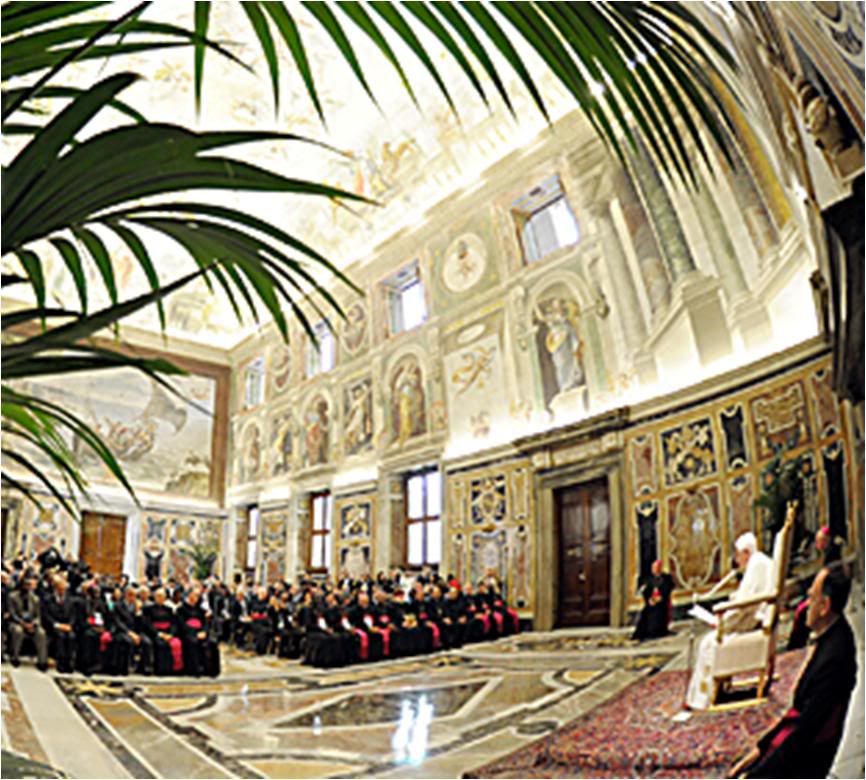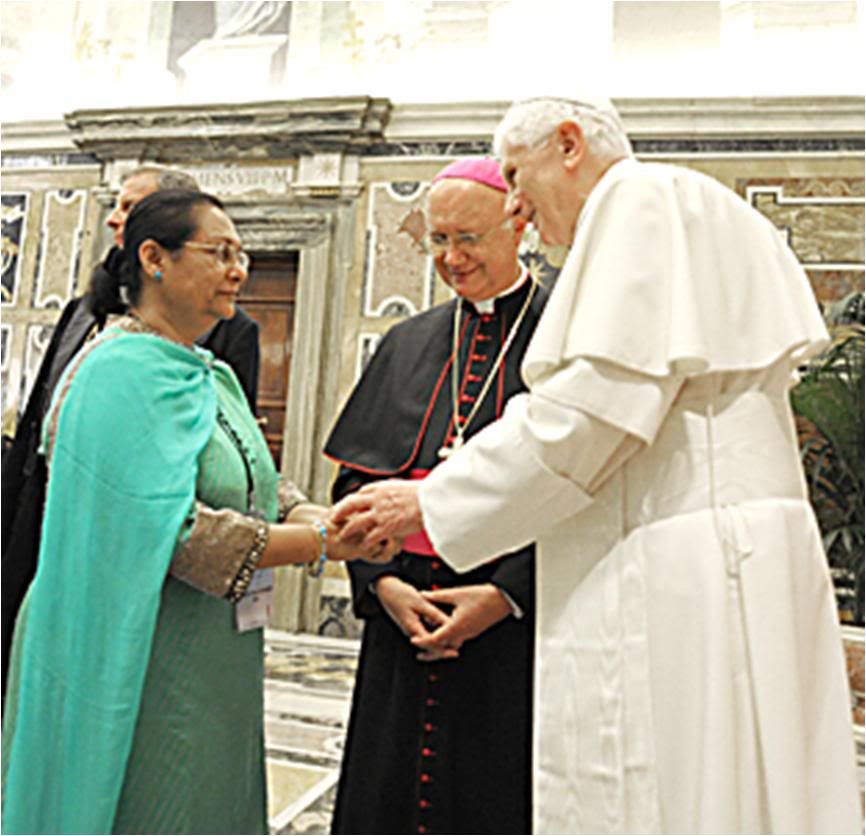| | | OFFLINE | | Post: 21.183
Post: 3.819 | Registrato il: 28/08/2005
Registrato il: 20/01/2009 | Administratore | Utente Master | |
|


 See preceding page for earlier posts today, 10/7/10.
See preceding page for earlier posts today, 10/7/10.


 Pope Benedict's discourse to
Pope Benedict's discourse to
participants of Catholic Press Congress


07 OCT 2010 (RV) - At midday today the Holy Father received participants in a congress on the Catholic press promoted by the Pontifical Council for Social Communications. The congress has been taking place this week in Rome.
Addressing the participants, who come from 85 countries, the Pope referred to two specific aspects of the role of the Catholic press.
On the one hand, he said, "there is the specific nature of the medium: the press; i.e., the written word and its importance and effectiveness in a society which has seen the burgeoning of dish antennae and satellites. ...
On the other hand, the 'Catholic' connotation with all its attendant responsibility of remaining explicitly and substantially faithful, through daily commitment to following the path of truth.
"Catholic journalists must seek the truth with impassioned minds and hearts", he added, "but also with the professionalism of competent workers equipped with adequate and efficient means".
Here is a full translation of the Holy Father's address to the journalists:
Dear brothers in the episcopate,
Distinguished ladies and gentlemen:
I welcome you with joy at the end of your four days of intense work sponosred by the Pontifical Council for Social Communications and dedicated to the Catholic press.
I greet you all, who come from 85 nations, and work in newspapers, weeklies or other periodicals and on Internet sites. I greet the president of the dicastery, Archbishop Claudio Maria Celli, whom I thank for speaking in behalf of everyone, as well as the secretaries, the undersecretary, and all his officials and personnel.
I am happy to be able to address you with a word of encouragement to continue, with renewed motivations, in your important and specialized work.
The world of the media is undergoing profound transformation even from within. The development of new technologies, and particularly, of widespread multimedia capabilities, appear to call into question the role of the more traditional and established media.
Opportunely, your Congress has dwelt on considering the specific role of the Catholic press. In fact, two particular aspects emerge from a careful reflection on this subject:
On the one hand, the specificity of the medium, namely the press, that is, the written word and its relevance and effectiveness - in a society that has seen a proliferation of antennae, parabolas and communications satellites which have almost become emblems of a new way of communications in the era of globalization.
On the other hand, the description 'Catholic', with the corresponding responsibility that you must be faithful to it in an explicit and substantial way through your daily commitment to follow the royal road of truth.
The search for truth should be pursued by Catholic journalists with passionate hearts and minds, but also with the professionalism of competent workers who avail of appropriate and efficient means.
This is even more important in this historical moment which demands that the journalist, as the mediator of complex currents of information, undergo a profound mutation.
Today, for example, the world of images has increasingly more weight with the development of ever newer technologies. But if all of this doubtless has its positive aspects, image can also become independent of reality, it can give rise to a virtual world with varying consequences, fhe first of which is the risk of indifference to reality.
Indeed, the new tecnologies, along with the progress they bring, can make the true and the false interchangeable; they can lead to confusing the real and the virtual.
Moreover, how an event, whether happy or sad, is reported, can turn it into a spectacle rather than an occasion to reflect. The search for ways to promote the human being becomes secondary because the event is presented principally to play to the emotions.
These aspects are like alarm bells. They invite us to consider the danger that the virtual takes us even farther from reality, which does not stimulate the search for what is true, for truth.
In this context, the Catholic press is called on, in a new way, to express its potential to the utmost and to give daily proof of its irrenunciable mission.
The Church disposes of a faciltiating element since the Christian faith and communications have a fundamental structure in common: the fact that the medium and the message are one and the same.
Indeed, the Son of God, the Word incarnate, is at the same time, a message of salvation and the means through which salvation is achieved.
This is not a simple concept, but it is a reality that is accessible to everyone, even to those who, despite being protagonists in the world's complexity, are still able to keep that intellectual honesty that is characteristic of the 'little ones' in the Gospel.
Moreover, the Church, mystical Body of Christ, who is present contemporaneously everywhere, nourishes the capacity for more fraternal and more human relationships, as a place for communion among believers, so that together, they are a sign and instrument of the vocation of everyone to communion.
Her strength is Christ, and in his name, she 'follows' man on the highways of the world to save him fom the mysterium iniquitatis which operates insidiously in the world.
The press evokes in a more direct manner, compared to other means of communication, the value of the written word. The Word of God came down to men and has been transmitted to us through a book, the Bible.
The word continues to be the fundamental instrument - and in a certain sense, the constitutive instrument - of communications. These days it is used in various forms, but even in the so-called 'civilization of image', it continues to retain all of its value.
From these brief considerations, it is evident that the communications challenge is, for the Church and those who share her mission, very demanding.
Christians cannot ignore the crisis of faith which has overcome society, or simply trust that the patrimony of values transmitted through the centuries can continue to inspire and shape the future of the human family.
The idea of living 'as if God did not exist' has been shown to be harmful; rather, the world needs to live 'as if God exists', even without the power of belief, otherwise it will only produce a 'dishuman humanism'.
Dearest brothers and sisters, whoever works in the communications media, if he does not want to be "a resounding gong or a clashing cymbal" (1 Cor 13,1) - as St. Paul would say - should keep the option strong within him that enables him to deal with the world by always placing God at the top of his scale of values.
The times in which we live, although they are remarkable for many positive things - because the threads of history are in the hands od God and as his eternal plan reveals itself farther - are nonetheless marked by so many shadows.
Your task, dear workers in the Catholic press, is to help contemporary man orient himself to Christ, the only Savior, and to keep alight in the world the torch of hope, so men may live today worthily and construct the future adequately.
And so, I exhort you to constantly renew your personal choice for Christ, drawing from those spiritual resources that the worldly mentality under-estimates, though they are invaluable, indeed indispensable.
Dear friends, I encourage you to continue with your none-too-easy task, and my prayers go with you, that the Holy Spirit may make your work ever more profitable.
My blessing, full of affection and gratitude, which I gladly give, embraces all of you present here and those who work in the Catholic media all over the world.
 With regard to the Pope's call for Cathoolic journalists to be Christian above all, there is a tendency among some in the Catholic media, particularly those with with recognizable bylines, to be 'journalists' first before they are Christian!
With regard to the Pope's call for Cathoolic journalists to be Christian above all, there is a tendency among some in the Catholic media, particularly those with with recognizable bylines, to be 'journalists' first before they are Christian!
In the name of supposed 'objectivity' - which is really a preemptive and defensive justification of themselves to their MSM colleagues, as in 'Hey just because I'm Catholic does not mean I don't see the rot in the Church!' - they consciously follow the herd mentality of the MSM in denouncing perceived (some of it, real enough) errors and failures of the Church and its hierarchy - but often failing to balance it off with the Church position. Or else, as in the reporting and commentary on the sex-abuse 'scandal', content to present the Church position with platitudinous generalizations instead of researching specific facts pertinent to whatever case is being discussed!
For Catholic journalists, bearing Christian witness should mean serving the truth, above all, not dominant opinion or their reputation among their secular peers.
[Modificato da TERESA BENEDETTA 08/10/2010 04:24] |